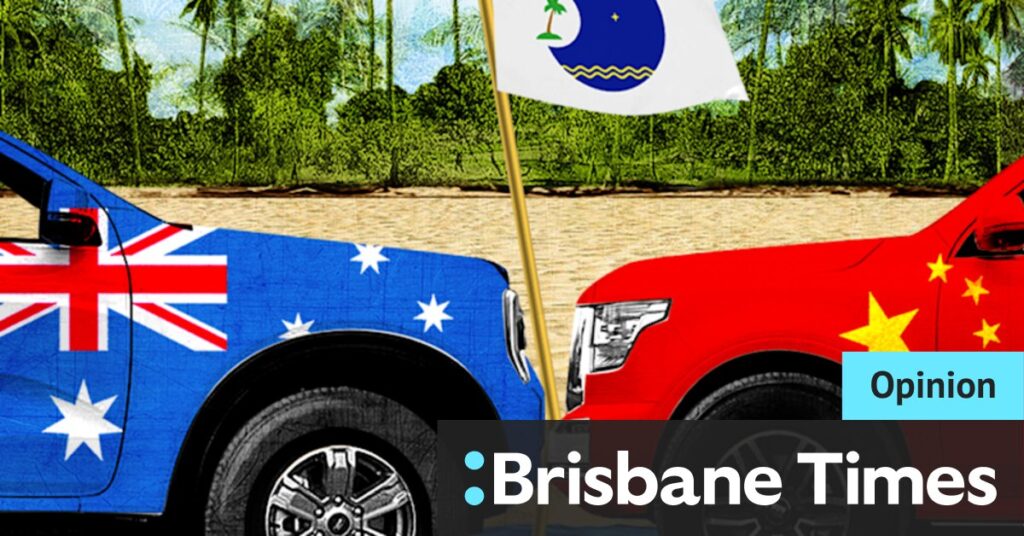
In a striking display of geopolitical maneuvering, China and Australia are currently locked in a high-stakes competition for influence over the Pacific Islands. This week, the Solomon Islands became the focal point of this contest as both nations made significant diplomatic gestures during the Pacific Islands Forum, the region’s premier political gathering.
Beijing made a bold move by gifting the Solomon Islands a fleet of 27 new vehicles intended to transport leaders and ministers during the summit. This gesture, though seemingly modest, carries significant weight in a nation where the per-capita income is comparable to that of Haiti and the Congo. The Solomon Islands’ Prime Minister, Jeremiah Manele, personally attended the handover ceremony, highlighting the importance of the gift.
Not to be outdone, Australia responded by announcing its own gift of 60 new vehicles to the Solomon Islands. “Australia continues to be the Pacific’s largest development partner, and security partner of choice,” stated Foreign Affairs Minister Penny Wong, alongside Pacific Island Affairs Minister Pat Conroy. The Australian vehicles are intended to be used for police purposes across various islands after the summit.
Strategic Competition and Security Concerns
Unspoken in these diplomatic exchanges is the underlying security concern. Canberra is wary of the potential for Chinese vehicles to be equipped with surveillance capabilities. By ensuring that forum leaders are chauffeured in Australian cars, Canberra aims to mitigate this risk. In addition to the vehicles, Australia is also providing support for the Solomon Islands’ cybersecurity, infrastructure upgrades around Honiara, and $3 million for summit logistics.
This competition is emblematic of a broader strategic rivalry between China and Australia in the Pacific region, often described as “hand-to-hand diplomatic combat.” Beijing’s cultural outreach includes initiatives like kung fu classes taught by Chinese police instructors, dubbed “kung fu diplomacy” by local media.
Historical Context and Shifting Alliances
The current dynamics in the Pacific are reminiscent of historical power struggles. During World War II, the Solomon Islands were a critical battleground as allied forces, including the US, Australia, and New Zealand, fought to dislodge Japanese forces from Guadalcanal. The battle was costly, with 29 ships sunk, 615 aircraft destroyed, and over 7,000 troops killed.
In recent years, Australia has been caught off-guard by China’s growing influence in the Pacific. A significant wake-up call came when China signed a security pact with the Solomon Islands, a move that involved offering substantial financial incentives to local politicians. Former opposition deputy leader Peter Kenilorea Jr. publicly stated that Chinese agents offered MPs between $300,000 and $900,000 to support Beijing’s interests.
“There are some bidding wars that Australia cannot win,” noted a regional analyst, reflecting on the challenges Australia faces in countering China’s financial clout.
Future Prospects and Strategic Proposals
As the competition intensifies, Australia is exploring new strategies to strengthen its position in the Pacific. Herve Lemahieu, director of research at the Lowy Institute, suggests a transformative approach: the creation of a Pacific Union. This initiative would aim to integrate the economies and societies of Pacific nations, including Australia and New Zealand, while excluding China and the US.
“Implementing a credible, deep, and wide integration project would be the single most consequential project for this generation in Australia’s foreign policy,” Lemahieu argues.
Drawing parallels to the European Union, Lemahieu posits that such a union could offer economic and political stability to Pacific nations, making them less susceptible to external influence. He cites the example of Poland and Ukraine post-Cold War, where EU membership propelled Poland to economic success while Ukraine struggled.
As Australia navigates this complex geopolitical landscape, it is clear that the Pacific region, once considered peripheral, is now of paramount importance. Australian diplomats are advised to prioritize postings in the Pacific over traditional power centers, as the outcomes of this regional contest will have lasting implications.
Looking ahead, Prime Minister Anthony Albanese’s upcoming visit to Papua New Guinea to celebrate its 50th anniversary of independence from Australia will further underscore the significance of these regional relationships. The anticipated defense agreement between the two nations is expected to bolster their strategic partnership.
The Pacific Islands, often referred to as the “Blue Pacific Continent,” are at the heart of a global power struggle. As China continues its efforts to establish military footholds in the region, the question remains whether the US, under potential future leadership, would intervene to counterbalance China’s ambitions.
In this evolving geopolitical chess game, Australia must remain vigilant and proactive to safeguard its interests and maintain stability in its near neighborhood.







